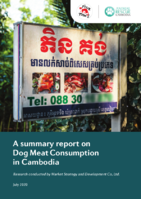
A summary report on Dog Meat Consumption in Cambodia
FOUR PAWS and Animal Rescue Cambodia released a new research publication, July 2020
FOUR PAWS is an international organisation working towards a vision of a world in which humans treat animals with respect, empathy and understanding. In line with this mission, FOUR PAWS wanted to study the consumption of dog meat in Cambodia, as part of designing a campaign to end dog and cat meat trade in Southeast Asia.
The problem was, that while much has been reported anecdotally about dog and cat meat consumption in Cambodia’s capital, there was no tangible, factual data on the prevalence or rates of this consumption.
What FOUR PAWS needed to do was accurately assess current levels of consumption, the breakdown of consumption across various demographics, and the factors which drive people to consume the meat. This information would allow them to determine who to target, assess what messages would be compelling to certain target groups and, at a later date, measure the success of any initiatives implemented.
To build this picture, FOUR PAWS undertook their own in-country investigation – the result of which is this report, conducted by research agency Market Strategy Development (MSD), a marketing and social research consulting firm in Cambodia that has undertaken a number of market, social science and socio-economic development research projects.
Read the report here:

A summary report on Dog Meat Consumption in Cambodia
FOUR PAWS and Animal Rescue Cambodia released a new research publication, July 2020
A more detailed version of this report is available on request to FOUR PAWS.
Currencies within this report are provided in US Dollars ($) and Euros (€), and Cambodia Riel (KHR) where available.
Conclusion
The findings of this study suggest that efforts to change the behaviors of heavy dog-meat consumers will need to be well thought-out and creative. Consumers primarily eat out of habit, enjoyment of the taste and social conditioning, so there is not one particular method with which to combat their eating preferences. Changing the law or proving that the meat is unhealthy could be opportunities but have their challenges. A campaign to end the consumption of dog meat, as a result, would require a multifaceted approach working with different groups of stakeholders and consumers.
Efforts might be focused on promoting methods to stop potential consumers from trying the meat in the first place, or persuading moderate consumers that their friends and family no longer want to consume. If the younger generation were to see dog-meat consumption as an old person’s habit or something that is not ‘cool’, they may stop adopting the habit and others will have no one to join with. The key feature of dog meat is that it is a social food; one that generally (with the exception of only the most frequent consumers), must be eaten in a group with others. This makes a potential situation where if one can stop some from eating dog meat it may have a knock-on social effect in getting others to stop.

